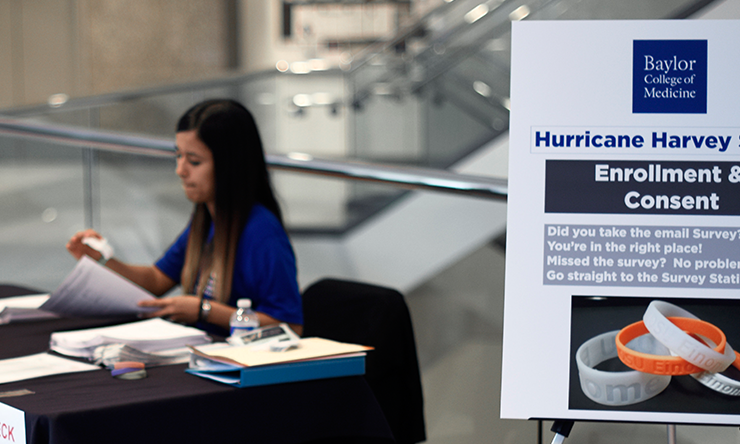Researchers share Harvey health impact findings at symposium
Since Hurricane Harvey devastated the Houston area two years ago, researchers have been studying the storm’s effect on public health and the emergency response by healthcare providers during a major disaster. On Thursday, Aug. 22, they will share what they have learned at an all-day symposium at Baylor College of Medicine.
The symposium brings together researchers from Baylor College of Medicine, the University of Texas Health Science Center at Houston, the University of Texas Medical Branch, Oregon State University and the National Institute of Environmental Health Sciences. Dr. Melissa Bondy, event organizer and professor and section head of epidemiology and population sciences at Baylor, will present her work on Harvey exposures and health outcomes after a major flooding disaster.
“Overall, the current analysis demonstrated that specific Harvey exposures were associated with increased risk of allergic symptoms and stress levels immediately after the hurricane and up to one year after the disaster,” said Bondy, associate director at the Dan L Duncan Comprehensive Cancer Center at Baylor.
The research projects span the health spectrum, from the impact of pollutants on people with asthma to the effects of the storm on mental health. Other presenters include:
Dr. Cheryl Walker, professor of molecular and cellular biology and medicine and director of the Baylor Center for Precision Environmental Health and Gulf Coast Center for Precision Environmental Health, will discuss how the immediate efforts by local and national research groups and community partners culminated in the launching of a disaster epidemiological study, the first of its kind in the Houston area.
Dr. Joseph Petrosino, professor of molecular virology and microbiology at Baylor, studied the storm’s impact on the human and residential microbiome and monitored exposure to mold and harmful toxins.
Dr. Asim Shah, professor and executive vice chair of the Menninger Department of Psychiatry and Behavioral Sciences at Baylor, will discuss lessons learned from the immediate mental health response team post Harvey at both the George R. Brown Convention Center and NRG Park.
Dr. Diana Rohlman, assistant professor of environmental and occupational health at Oregon State University, analyzed chemical exposure on 173 wristbands given to residents after Harvey. She will discuss the findings of those exposure tests.
Dr. Winifred Hamilton, associate professor of medicine and director of Environmental Health Service at Baylor, studied a group of African American adults with asthma before and after the storm and will discuss how exposure during the storm impacted their asthma.
Dr. Abiodun Oluyomi, assistant professor of medicine in Environmental Health Service at Baylor, will present findings from the geospatial analysis of neighborhood-level Harvey-related environmental sampling data, including air and water.
Dr. Eric Storch, professor and vice chair of psychology at Baylor, studied the long-term psychological impacts of the storm. He will discuss the results of collaborations to provide mental health services, in part through telehealth programs.
Dr. Brent Kaziny, assistant professor of pediatrics – emergency medicine at Baylor, compared clinic work conducted in mega-shelters in the wake of both Hurricane Harvey in Houston and Hurricane Katrina in New Orleans. He will discuss common diagnoses in pediatric patients at those clinics.
Dr. Corrie Chumpitazi, associate professor of pediatrics – emergency medicine at Baylor, studied pediatric emergency departments and urgent care clinics to determine if those exposed to flood water had more visits and if there was an increase in cases of upper respiratory and skin infections.
Dr. Sharon Croisant, professor of environmental health and medicine at the University of Texas Medical Branch, will discuss lessons learned during disaster research response and best practices for a “RAPPID” response to disasters impacting human health.
Dr. Aubrey Miller, senior medical advisor at the National Institute of Environmental Health Sciences at the National Institutes of Health, will discuss how academic institutions across the U.S. can support public health agencies in response to large-scale emergencies and disasters.
Dr. Elena Craft, senior director of Climate and Health at the Environmental Defense Fund, will discuss the Hurricane Harvey Registry, which assessed nearly 20,000 Houstonians after the storm. She will highlight the health and housing impacts as well as current efforts to support those impacted.
Dr. Elaine Symanski, professor and chair of the Southwest Center for Occupational and Environmental Health at The University of Texas Health Science Center at Houston (UTHealth) School of Public Health, will discuss the SWCOEH’s disaster response, including conducting environmental monitoring and training with safety kits on how to properly clean up flooded homes.
Baylor College of Medicine President and CEO Dr. Paul Klotman will recognize Houston Mayor Sylvester Turner and former Harris County Judge Ed Emmett for their work during and after the storm. Mayor Turner will present Dr. Klotman with a City of Houston proclamation.
The event is hosted by the Section of Epidemiology and Population Science in the Margaret M. and Albert B. Alkek Department of Medicine at Baylor and the Gulf Coast Center for Precision Environmental Health at Baylor, with support from the National Institute of Environmental Health Sciences. The Environmental Health Service in the Department of Medicine at Baylor provided additional support. A complete description of presentations is available online.
The symposium will take place in Cullen Auditorium at Baylor College of Medicine from 9:30 a.m. to 4:30 p.m. The event is free and open to the public, but registration is required. Sign up online. For more information, call (713) 798-2937 or send an email to Harveystudy@bcm.edu. Media wishing to attend should contact Molly Chiu at (713) 798-4710 or molly.chiu2@bcm.edu.










